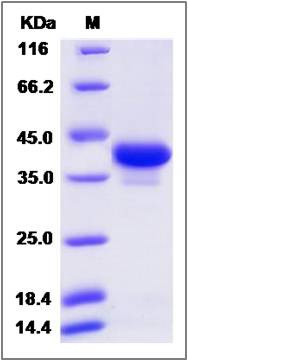Human CD81 / TAPA-1 Protein (Fc Tag)
CVID6,S5.7,TAPA1,TSPAN28
- 100ug (NPP1994) Please inquiry
| Catalog Number | P14244-H04H |
|---|---|
| Organism Species | Human |
| Host | Human Cells |
| Synonyms | CVID6,S5.7,TAPA1,TSPAN28 |
| Molecular Weight | The recombinant human CD81/mFc comprises 325 amino acids and has a predicted molecular mass of 36.4 kDa. The apparent molecular mass of the monomer is approximately 38-42 kDa in SDS-PAGE under reducing conditions due to glycosylation. |
| predicted N | Asp |
| SDS-PAGE |  |
| Purity | (94.0 %+4.4) % as determined by SDS-PAGE |
| Protein Construction | A DNA sequence encoding the human CD81 (NP_004347.1) (Phe113-Lys201) was expressed with the Fc region of mouse IgG1 at the N-terminus. |
| Bio-activity | |
| Research Area | Immunology |Cluster of Differentiation (CD) |B Cell CD Antigen |
| Formulation | Lyophilized from sterile PBS, pH 7.4. 1. Normally 5 % - 8 % trehalose and mannitol are added as protectants before lyophilization. Specific concentrations are included in the hardcopy of COA. |
| Background | CD81, also known as TAPA-1, belongs to the transmembrane 4 superfamily, also known as the tetraspanin family. Members of this family mediate signal transduction events that play a role in the regulation of cell development, activation, growth and motility.CD81 is a widely expressed cell-surface protein involved in an astonishing variety of biologic responses. It is related to adhesion, morphology, activation, proliferation, and differentiation of B, T, and other cells. On B cells CD81 is part of a complex with CD21, CD19, and Leu13. This complex reduces the threshold for B cell activation via the B cell receptor by bridging Ag specific recognition and CD21-mediated complement recognition. |
| Reference |
